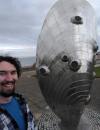Dr Tim Regan (Career Track Fellow)
Group Leader

Contact details
Address
- Street
-
The Roslin Institute
Easter Bush Campus
Midlothian - City
- Post code
- EH25 9RG
Background
Dr. Tim Regan is a Career Track Fellow at the Roslin Institute, University of Edinburgh, where he leads a research group investigating the immunology of invertebrate aquaculture species in the context of industry-relevant challenges. His current work focuses on the health and resilience of wild and farmed blue mussel populations, with an emphasis on host–pathogen interactions, molecular diagnostics, and genomics.
Tim’s research career began with a PhD on innate immune regulation in the human gastrointestinal tract, applying siRNA screening, infection assays, and molecular biology approaches in UCC, Cork, Ireland. After joining Roslin in 2014, he expanded into bioinformatics and systems biology, working on macrophage transcriptomics and honey bee metagenomics. He later applied genome-scale CRISPR screening to study host susceptibility and resistance genes in collaboration with clinical researchers.
Since moving into aquaculture in 2019, Tim has worked closely with government and industry partners to improve bivalve culture in the UK. He is passionate about the role of aquaculture in sustainable food production and about supporting the growth of Scotland’s shellfish sector through applied, collaborative science.
Current PhD students supervised
Kallen Sullivan
Rob Stewart
Camilo Munoz Schuler
Past PhD students supervised
Hannah Farley
Research summary
Dr. Regan’s lab investigates the immune systems of invertebrate aquaculture species, with a focus on diseases of industry relevance. His group studies how shellfish interact with their associated microbiomes, respond to environmental stressors, and are influenced by surrounding microbial communities.
In the near term, much of this research centres on blue mussels, exploring how host genetics and environmental change shape immune function. The lab applies a wide range of molecular biology and -omics approaches to understand these processes and to support the development of sustainable, resilient aquaculture practices.
